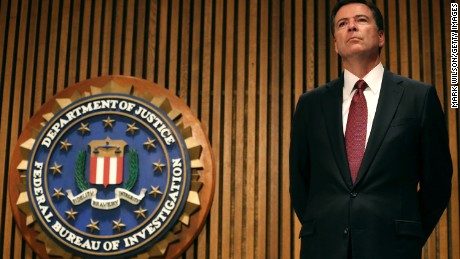(CNN) James Comey found out he had been fired as FBI director just like the rest of us: By watching it on television. The move, announced late Tuesday via a letter sent from President Donald Trump to Comey, marked the most unpredictable moment of a presidency that through its first 100-plus days has been the least orthodox in memory. It also ramped up criticism of Trump's judgments Comey was tasked with leading the investigation into Russia's meddling into the 2016 campaign and what, if any, collusion had occurred between Trump campaign operatives and Russian intelligence officials and left official Washington reeling over a move considered unthinkable as recently as this week.
The explanation for the move, which emerged into the stunned silence it caused, made little logical sense. A report from deputy Attorney General Rod Rosenstein highlighted Comey's handling of the FBI investigation into Hillary Clinton's private email server as the main reason for his dismissal. Rosenstein accused Comey of an attempt to "usurp" the power of the attorney general by announcing publicly that he didn't believe any charges should be brought against Clinton in a July 5, 2016 press conference.
"Compounding the error, the director ignored another longstanding principle: We do not hold press conferences to release derogatory information about the subject of a declined criminal investigation," Rosenstein added. "The way the director handled the conclusion of the email investigation was wrong. As a result, the FBI is unlikely to regain public and congressional trust until it has a director who understands the gravity of the mistakes and pledges never to repeat them."
That echoes criticism launched by Democrats loyal to Clinton, who insisted that Comey's decision to offer his own unvarnished view of Clinton's conduct vis-a-vis her private email server -- he said she had been "extremely careless" went well beyond his proscribed duties. The problem with laying the Comey firing at the feet of the July 2016 press conference is that it is now May 9, 2017.
Why, if Trump was so unhappy over Comey's handling of the Clinton email investigation, would he say the following of the FBI director in October following the decision to re-open the Clinton case: "It took guts for Director Comey to make the move that he made in light of the kind of opposition he had where they're trying to protect her from criminal prosecution"?
If Trump had such an issue with how Comey had handled the Clinton investigation, why would he not have jettisoned Comey shortly after taking office on January 20?
Why, if Trump was so dissatisfied with Comey, would he single the FBI director out for praise in a gathering of law enforcement officials at the White House on January 22?
Why, if Trump was so unhappy with Comey, would he not have fired him before Attorney General Jeff Sessions was forced to recuse himself from all Justice Department investigations involving the attempted Russia hack because he failed to disclose two meetings with Russian Ambassador Sergey Kislyak? (Sessions' recusal effectively made Comey the point person on that investigation.)
The letter Trump sent to Comey or, more accurately, released to the media -- answers none of those questions while raising even more. The second paragraph, in particular, is eye popping.
"While I greatly appreciate you informing me, on three separate occasions, that I am not under investigation, I nevertheless concur with the judgment of the Department of Justice that you are not able to effectively lead the Bureau," Trump wrote to Comey. The not-so-subtle message from Trump: I want everyone to know you told me three times! that I am not the target of this Russia investigation. You told me that three times. Remember the three times you told me I wasn't under investigation for this Russia stuff? Also, you're fired. What Trump is doing here is not simply unpredictable. It is potentially very dangerous.
Removing the person charged with overseeing an investigation into a foreign country attempting to influence US elections by hurting one candidate (Clinton) and helping another (Trump) sends a chilling message up and down the federal bureaucracy not to mention the populace.
Even if Trump's decision to get rid of Comey had absolutely nothing to do with the ongoing Russia investigation, it looks very, very bad. It looks to anyone paying attention like Trump got rid of someone who he didn't think would come to a conclusion he liked regarding Russia. Or that, more generally, that no one not even an FBI director in the middle of his 10-year term is safe from Trump's whims.
Trump could solve or at least mitigate this perception by allowing (or even calling for) the appointment of an independent counsel to take over the Russian investigation. But Trump and his White House allies have been extremely resistant to even acknowledging that the Russia investigation is merited; Trump called the Russia story a "total hoax" in a tweet earlier Tuesday. Given that, it's hard to imagine him suddenly calling for the appointment of a neutral third party to get to the bottom of exactly how effective Russia was in its attempts to meddle with our elections.
Trump promised that he would shake up Washington when he was elected the 45th president of the United States. He has made good on that promise nearly every day since taking office on January 20. But this move the stunning dismissal of the FBI director in the midst of a probe involving Trump's campaign and Russia feels like a shifting of gears even for Trump, a ramping-up of an offensive to remove dissenting voices from the federal bureaucracy. What the country desperately needs right now is some explanation from President Trump. If past is prologue, we won't get one.

No comments:
Post a Comment